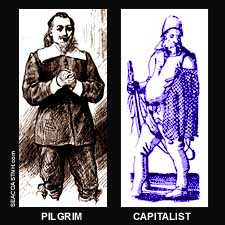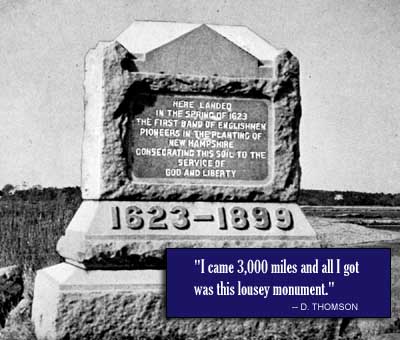| David Thomson Vs the Pilgrims |

NH’s 1ST FIRST FAMILY
To the winner goes the spin. If New Hampshire had been settled three years earlier, would we see America in a different light today? The Granite State was founded by a Scottish gentleman seeking, not religious freedom, but wealth and security. But David Thomson disappeared and the pilgrims – well you know that story. Instead of his own national holiday, Thomson got nothing but a stone marker and a footnote.
VISIT: Thomson Monument in Rye, NH
READ: Why Martin Pring Discovered NH
New Hampshire suffers from "pilgrim envy". Our founding father David Thomson showed up in 1623, three years after the Pilgrims settled at Plymouth Plantation. He brought his wife Amais who also gets no respect in American history texts. They fished and traded with Piscataqua area Indians and the New Hampshire province was born. But because David Thomson left town a few years later and died mysteriously, we have all but forgotten him.
There is a monument to him over near Odiorne Point where Thomson reportedly built Pannaway, the original fishing and trading outpost. I’ve never found the monument, but others say they have. The memorial stone is not directly dedicated to Thomson, but to the "first band of Englishmen pioneers". The Hilton brothers who settled at "Dover Neck" may have been among them. Historians are fairly certain that some European fishermen were well established on the Isles of Shoals long before Thomson’s men arrived here or the Pilgrim’s came to Plymouth, perhaps even before the 1607 colony at Jamestown.
But early New Hampshire history is pretty anorexic. Facts run thin and nobody in almost 400 years has seen fit to fatten up the story. New Hampshire was not smart enough to invent a mythical rock where Thomson first set foot. We have not commissioned artists to speculate on his appearance or rebuild his ship The Speedwell, or created an imagined village of houses in a history theme park populated by re-enactors who keep the story alive. There is no David Thomson Wax Museum like the one in Plymouth, Massachusetts. There is no national holiday based, as Thanksgiving is, on the thinnest of details and extrapolated into a grand culture of make-believe stories.

All this does nothing to malign the Pilgrims. They didn't write the history books or script the made-for-TV specials or inflate the giant Underdog balloon for Macy's Thanksgiving Day Parade. We did all that, and are left without an ounce of energy for the telling of the New Hampshire founding. The bad thing is that the mythological Pilgrims get so much attention that the real stories are left behind. By buying into the hyped version of "thanksgiving", we fall into the believe that America was primarily founded by people seeking religious freedom. We ignore the fact that our European "discovery", colonization and development was largely about money, power and politics. That was who we were then – and goes to explain who we are as a nation today.
By canonizing our forebears, we have made them largely inaccessible. But there was a time when we really needed the Pilgrims to be saints. George Washington needed the myth of Plymouth after the Revolution, just as Abraham Lincoln needed to invoke the healing myths of Washington during terrible Civil War. America was a mess back when New Hampshire's Sara Hale talked Lincoln into the Thanksgiving holiday idea. America was schizoid back then and the Pilgrims were pure Prozac.
But eventually everybody, and every country has to grow up. What some call "revisionist" history, in many cases, is simply history stripped of centuries of white-wash. Visitors who tour Plimouth Plantation today hear a very different and much more authentic version of the story than they did 50 years ago when this history theme park first opened. We are growing capable of hearing diverse and alternative views of the founding of America. That does not mean tossing out Thanksgiving as a ritual, but it does mean separating the ritual from the facts.
Facts about the "real" Thanksgiving are widely available. Facts about New Hampshire’s founders are hardly available anywhere. Here are a few – subject to change as more details emerge.
-- On October 16, 1622, Thomson received a 6000-acre grant for Piscataqua from the New England Company. Little is known about Thomson except that he was granted the land by the same folks in Plymouth, England who gave the Pilgrims the nod.
-- Genevieve Cora Fraser, who has traveled widely in search of information on Thomson, says he was also a lawyer and a gentleman, a man of distinguished status. She has traced his lineage and gathered a great deal of data to support this claim.
CONTINUE to read about DAVID THOMSON
NH's FIST CITIZEN IN 1623 (continued)

-- David Thomson came to fish off the Isles of Shoals and to trade with the Indians. He was a scholar, a clerk, an apothecary, a traveler, a capitalist and a Scot. Thomson had married Amias Cole 10 years earlier in Plymouth, England. Their son John was the first European born in what is now New Hampshire. They left a daughter behind and never saw her again.
-- Unlike the Pilgrims, Thomson knew where he was going. He had been here a least once before, maybe a number of times, and had selected the Piscataqua River ("where he liketh well") as the cradle of America. The Pilgrims were headed to "Virginia" and, as the story goes were "blown off course." There is evidence that Thomson was making land deals in this area as early as 1619.
-- Thomson had likely been to Plymouth, Massachusetts too even before the Pilgrims arrived. In fact, there is speculation that he influenced the captain of the Mayflower by telling him of that location in advance. Did Thomson therefore save the entire Plymouth Colony from a stormy death at sea? No one knows, but it makes a nice story.
-- Unlike most of the Pilgrims, Thomson got along quite well with the Indians. As a capitalist, he had little choice. His financial backers wanted a return on their investment, and the Indians had top grade furs for sale. Some historians believe Thomson's friendship with the Native Americans in Maine may have saved a trading ship from being attacked. It is also reported that the local Indians complained to Thomson when hey were mistreated by the Pilgrims. Yet Pannaway was built with a high palisade mounted with fearsome guns. It is known that Thomson had at least one Indian servant (read "slave"). A local Indian chief reportedly presented Thomson with his own son as a welcoming gift.
-- Thomson, instead of the Pilgrims, may have been "friends" with the famous Squanto. One privately published Thomson history called "The First Yankee" theorizes that -- while under house arrest in Plymouth, England -- the captured Squanto was cared for by a 14-year old ward of Sir Ferdinando Gorges. Gorges with John Mason owned land title to New England. At that exact time, in the same town, in the same household lived 14-year old David Thomson. Coincidence? There is even speculation that the young Thomson may have taught the captured Native American Squanto to speak the King's English, then been inspired by his captor to travel to the New World. Sure it is wild stuff, almost as wild as Plymouth Rock.
-- Before founding NH, Thomson had wintered in nearby Maine. After returning with his wife and wintering three years as NH's first whites, they packed up in 1626 and became the first white residents of Boston. Thomson built a new house in Boston Harbor on what is now called Thomson Island. His son John later made claim to the land.
-- David Thomson mysteriously disappeared in 1628. His wife Amias remarried, and since the Pilgrims considered marriage a "civil" ceremony, her Church of England wedding goes on the books as the first nuptials in New England. She moved from Thomson Island and joined her new husband in Chelsea. MA. Some historians hint at foul play in Thomson’s sudden death. We do not know.
-- Although isolated in New Hampshire, the Thomson's had quite a few house guests. One was a shipwrecked sailor who had been robbed by the Indians of everything including his clothes. Explorer Christopher Levett wrote that he stopped with Thomson for a month in 1623. Another visitor was the infamous Miles Standish, military commander of the Plymouth settlers. Standish arranged for Thomson to supply food to the starving Pilgrims. Thomson personally took a load of salted codfish to Plymouth. According to a Pilgrim journal, Thomson's errand of mercy initiated a second thanksgiving celebration. The diarist also complained that Thomson had charged too much. Thomson was the first New Hampshire capitalist, but far from the last, to see Massachusetts as a colony of potential customers.
Copyright © 2005 by J. Dennis Robinson. Dennis Robinson is editor and owner of SeacoastNH.com, an award-winning regional web site. He is currently proofreading a juvenile history of colonial Maryland and writing a history of outlaw Jesse James.
SEE: Turkkeygate, the Thanksgiving Scandal
